Related Research Articles
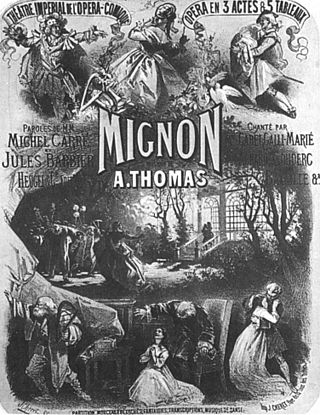
Mignon is an 1866 opéra comique in three acts by Ambroise Thomas. The original French libretto was by Jules Barbier and Michel Carré, based on Goethe's 1795-96 novel Wilhelm Meisters Lehrjahre. The Italian version was translated by Giuseppe Zaffira. The opera is mentioned in James Joyce's "The Dead" and Willa Cather's The Professor's House. Thomas's goddaughter Mignon Nevada was named after the main character.
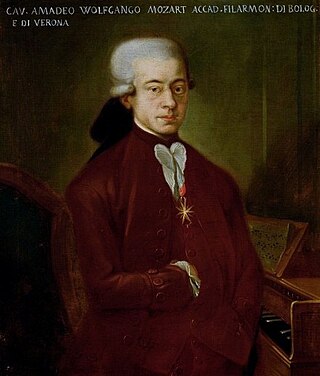
Il re pastore is an opera, K. 208, written by Wolfgang Amadeus Mozart to an Italian libretto by Metastasio, edited by Giambattista Varesco. It is an opera seria. The opera was first performed on 23 April 1775 in Salzburg in the Rittersaal of the Residenz-Theater in the palace of the Archbishop Count Hieronymus von Colloredo.
Iris is an opera in three acts by Pietro Mascagni to an original Italian libretto by Luigi Illica. It premiered on 22 November 1898 at the Teatro Costanzi in Rome. The story is set in Japan during legendary times.
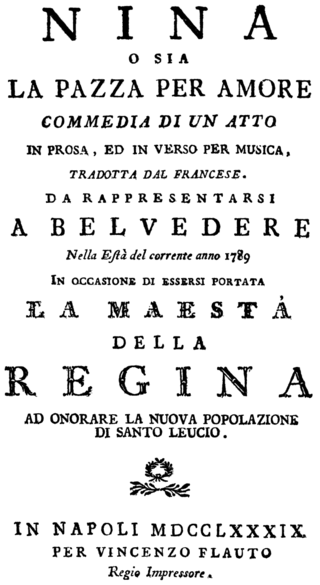
Nina, o sia La pazza per amore is an opera, described in 1790 as a commedia in prosa ed in verso per musica, in two acts by Giovanni Paisiello to an Italian libretto by Giovanni Battista Lorenzi after Giuseppe Carpani's translation of Benoît-Joseph Marsollier's Nina, ou La folle par amour, set by Nicolas Dalayrac in 1786. The work is a sentimental comedy with set numbers, recitative and spoken dialog. It is set in Italy in the 18th century. Nina was first performed in a one-act version at the Teatro del Reale Sito di Belvedere in Caserta, San Leucio on 25 June 1789. The revised and familiar two-act work was presented at the Teatro dei Fiorentini in Naples in the autumn of 1790.

William Ratcliff is an opera in three acts, composed by César Cui during 1861–1868; it was premiered on 14 February 1869 at the Mariinsky Theatre in Saint Petersburg under the conductorship of Eduard Nápravník. Although it was revived in Moscow in 1900 under Mikhail Ippolitov-Ivanov, it never became part of the standard operatic repertoire either in Russia or in the West. Nevertheless, this opera has considerable significance in the history of Russian art music, not only for the fact that it was the first opera by a member of The Five to reach the stage, but also for musical features that suggest experimentation and interrelationships among The Five.
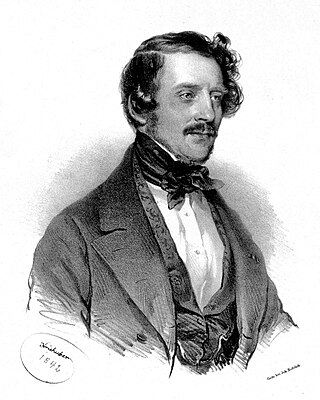
Maria Padilla is a melodramma, or opera, in three acts by Gaetano Donizetti. Gaetano Rossi and the composer wrote the Italian libretto after François Ancelot's play. It premiered on 26 December 1841 at La Scala, Milan. The plot is loosely based on the historical figure María de Padilla, the mistress of Pedro the Cruel, King of Castile.
Isabeau is a leggenda drammatica or opera in three parts by Pietro Mascagni, 1911, from an Italian libretto by Luigi Illica. Mascagni conducted its first performance on 2 June 1911 at the Teatro Coliseo, Buenos Aires.
Silvano is a dramma marinaresco or opera in two acts by Pietro Mascagni from a libretto by Giovanni Targioni-Tozzetti, based on a novel by Alphonse Karr. It received its first performance on 25 March 1895 at La Scala, Milan. Although rarely performed today, the music is of some technical accomplishment, and when revived, Silvano has been favourably received. The barcarolle from Silvano features prominently in a montage during the Martin Scorsese film Raging Bull.

Enrico di Borgogna is an opera eroica or "heroic" opera in two acts by Gaetano Donizetti. Bartolomeo Merelli, wrote the Italian libretto based on Der Graf von Burgund by August von Kotzebue.

La cambiale di matrimonio is a one-act operatic farsa comica by Gioachino Rossini to a libretto by Gaetano Rossi. The libretto was based on the play by Camillo Federici (1791) and a previous libretto by Giuseppe Checcherini for Carlo Coccia's 1807 opera, Il matrimonio per lettera di cambio. The opera debuted on 3 November 1810 at the Teatro San Moisè in Venice. It had a run of thirteen performances at Teatro San Moisè.

Lina Bruna Rasa was an Italian operatic dramatic soprano. She was particularly noted for her performances in the verismo repertoire and was a favourite of Pietro Mascagni who considered her the ideal Santuzza. Bruna Rasa created the roles of Atte in Mascagni's Nerone, Cecilia Sagredo in Franco Vittadini's La Sagredo and Saint Clare in Licinio Refice's 1926 oratorio, Trittico Francescano. She also sang the role of Tsaritsa Militrisa in the Italian premiere of Nikolai Rimsky-Korsakov's The Tale of Tsar Saltan.

Cavalleria rusticana is an opera in one act by Pietro Mascagni to an Italian libretto by Giovanni Targioni-Tozzetti and Guido Menasci, adapted from an 1880 short story of the same name and subsequent play by Giovanni Verga. Considered one of the classic verismo operas, it premiered on 17 May 1890 at the Teatro Costanzi in Rome. Since 1893, it has often been performed in a so-called Cav/Pag double-bill with Pagliacci by Ruggero Leoncavallo.
Pinotta is an idillio or opera in 2 acts by Pietro Mascagni from an Italian libretto by Giovanni Targioni-Tozzetti. The opera received its first performance on 23 March 1932 at the Teatro del Casinò in San Remo.
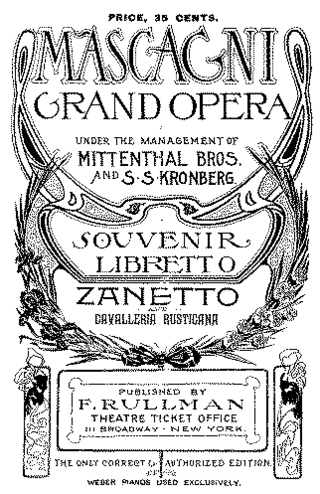
Zanetto is an opera in one act by Pietro Mascagni to an Italian libretto by Giovanni Targioni-Tozzetti and Guido Menasci. It received its first performance on 2 March 1896 at the Liceo Musicale Rossini in Pesaro. Only 40 minutes long and with cast of two singers, Zanetto was originally described by its composer as a scena lirica rather than an opera. It is set in the countryside near Florence during the Renaissance and tells the story of an encounter between a beautiful courtesan, Silvia, and a young wandering minstrel, Zanetto. The libretto was adapted from an Italian translation by Emilio Praga of François Coppée's play Le passant in which the young Sarah Bernhardt had won fame in the en travesti role of Zanetto.
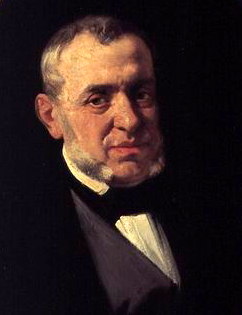
Elisa e Claudio, ossia L'amore protetto dall'amicizia is a two-act melodramma semiseria by the 19th Century Italian composer Saverio Mercadante from a libretto by Luigi Romanelli based on the play, Rosella by Filipo Casari. It received its premiere performance at La Scala in Milan on 30 October 1821.

La cour de Célimène, also known as Les douze is an opéra comique in two acts by French composer Ambroise Thomas. The original French libretto was by Joseph-Bernard Rosier (1804–1880). The principal character, the Countess, is not named, but her nickname in the opera, Célimène, refers to a character in Molière's drama Le Misanthrope who has a large number of suitors.

Angiolina Ortolani-Tiberini was an Italian soprano who sang many leading roles in European opera houses during a career spanning over twenty years. After their marriage in 1858, her career was closely entwined with that of her husband, the tenor Mario Tiberini, with the couple often appearing together on stage. Amongst the roles she created was Ofelia in Franco Faccio's Amleto.

Maria Carbone was an Italian operatic soprano. She created the lead female roles in two of Gian Francesco Malipiero's operas: the title role in Ecuba and Cleopatra in Antonio e Cleopatra.

Regina Diaz is an opera in two acts composed by Umberto Giordano to a libretto by Giovanni Targioni-Tozzetti and Guido Menasci. It premiered on 5 March 1894 at the Teatro Mercadante in Naples. The libretto is based on Lockroy's and Edmond Badon's Un duel sous le cardinal de Richelieu, which was also the source of Donizetti's 1843 opera Maria di Rohan, although the setting for Giordano's version was moved from 17th-century Paris to 18th-century Naples. The opera was a failure at its premiere and withdrawn after the second performance. Giordano's patron and publisher, Edoardo Sonzogno, blamed the failure on the poor libretto. Giordano blamed it on Sonzogno's interference in the production.

Concepció Bordalba i Simón was a Catalan operatic soprano who performed under the name Concetta Bordalba outside her native Spain. She spent most of her career in Italy or with touring Italian opera companies and was particularly known for her performances as Elsa in Wagner's Lohengrin and Margherita in Boito's Mefistofele.
References
Notes
- ↑ Davis 2003.
- ↑ Allison 2015.
- ↑ Powrie & Stilwell 2006, p. 21.
- ↑ Boosey & Hawkes.
- ↑ Casaglia.
Sources
- Allison, John (26 October 2015). "Koanga and Guglielmo Ratcliff, Wexford Festival, review: 'sultry and luscious'". The Daily Telegraph . London. Retrieved 31 October 2015.
- Boosey & Hawkes. "Ratcliff (1914)]" (opera by Volkmar Andreae).
- Casaglia, Gherardo (2005)."Guglielmo Ratcliff, 16 February 1895". L'Almanacco di Gherardo Casaglia (in Italian).
- Davis, Peter G., "Review: Guglielmo Ratcliff performed by Teatro Grattacielo, Alice Tully Hall, November 25, 2003, New York , 8 December 2003
- Powrie, Phil; Stilwell, Robynn Jeananne (2006). Changing Tunes: The Use of Pre-existing Music in Film. Ashgate Publishing. ISBN 0-7546-5137-1.
- Venturi, Fulvio. "Guglielmo Ratcliff – live performances". mascagni.org. Archived from the original on 2008-09-25.